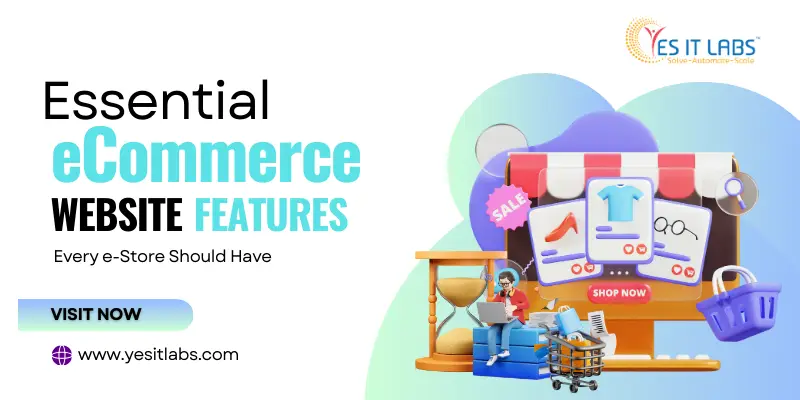
 By Alexis Bell
By Alexis Bell Essential eCommerce Website Features Every e-Store Should Have
Welcome to the digital marketplace, where the click of a button can whisk you away to a world of endless products and services. In today’s bustling online economy, having a robust eCommerce website isn’t just a luxury – it’s a necessity. Whether you’re a seasoned entrepreneur or just dipping your toes into the world of online retail, understanding the essential features that every e-store should have is crucial for success.
In this blog, we’ll take a deep dive into the must-have features that can elevate your eCommerce website from good to great. From user experience enhancements to security measures, we’ll cover it all. So, grab a cup of coffee, sit back, and let’s explore the key components of a winning eCommerce platform.
Seamless User Experience (UX)
First impressions matter, especially in the digital realm. Your eCommerce website should be intuitive and easy to navigate, ensuring that visitors can find what they’re looking for without frustration. Here are some features to consider:
- Mobile Responsiveness: With more users accessing the internet via smartphones and tablets, your website must adapt seamlessly to different screen sizes.
- Intuitive Navigation: Implement clear categories, filters, and search functionality to help users find products quickly.
- Smooth Checkout Process: Minimize the number of steps required to complete a purchase and offer guest checkout options to streamline the buying process.
High-Quality Product Imagery and Descriptions
In the absence of physical interaction, compelling product imagery and detailed descriptions are your best allies in persuading customers to make a purchase. How to make your stuff stand out on the internet:
- High-Resolution Images: Provide multiple high-quality images that showcase the product from different angles.
- Detailed Descriptions: Include accurate product specifications, dimensions, and other relevant information to help customers make informed decisions.
- User-Generated Content: Encourage customers to leave reviews and upload photos of the products they’ve purchased to build trust and authenticity.
Secure Payment Gateway
In an era of increasing cyber threats, ensuring the security of customer data is paramount. Partner with trusted payment gateways and implement robust security measures to safeguard sensitive information:
- SSL Encryption: Secure all data transmissions with SSL encryption to protect customer information from unauthorized access.
- PCI Compliance: Adhere to Payment Card Industry Data Security Standard (PCI DSS) requirements to maintain the integrity of cardholder data.
- Fraud Prevention Tools: Implement fraud detection algorithms and address verification systems to mitigate the risk of fraudulent transactions.
Personalization and Customer Engagement
Make your customers feel valued by delivering personalized shopping experiences and fostering meaningful interactions. Here’s how to tailor your eCommerce website to meet individual needs:
- Recommendation Engines: Leverage machine learning algorithms to suggest relevant products based on past purchase history and browsing behavior.
- Dynamic Content: Display targeted promotions, discounts, and product recommendations based on user preferences and demographics.
- Interactive Elements: Incorporate live chat support, product configurators, and interactive tools to engage customers and provide real-time assistance.
Robust Backend Functionality
While the frontend of your eCommerce website is what customers interact with, the backend infrastructure is equally important for smooth operations. Invest in a scalable and reliable eCommerce platform that offers:
- Inventory Management: Keep track of stock levels, automate replenishment orders, and synchronize inventory across multiple sales channels.
- Order Processing: Streamline order fulfillment processes, generate shipping labels, and provide order tracking capabilities to keep customers informed.
- Analytics and Reporting: Gain insights into sales performance, customer behavior, and website traffic patterns to make data-driven decisions and optimize marketing strategies.
Search Engine Optimization (SEO) and Marketing Tools
In the crowded digital landscape, standing out from the competition requires strategic marketing efforts and visibility on search engine results pages (SERPs). Maximize your eCommerce website’s online presence with:
- SEO-Friendly URLs and Metadata: Optimize product pages with descriptive URLs, meta titles, and meta descriptions to improve search engine rankings.
- Content Marketing: Publish blog posts, product guides, and tutorials to attract organic traffic and establish your brand as an industry authority.
- Social Media Integration: Enable social sharing buttons, showcase user-generated content, and leverage social media advertising to expand your reach and drive conversions.
Conclusion: Elevate Your eCommerce Game
In the fast-paced world of online retail, staying ahead of the curve requires continuous innovation and adaptation. By incorporating these essential features into your eCommerce website, you can create a compelling shopping experience that delights customers and drives business growth.
Remember, success in eCommerce isn’t just about selling products – it’s about building relationships, fostering trust, and delivering value at every touchpoint. So, whether you’re a startup seeking eCommerce website development services or an established retailer looking to revamp your online presence, prioritize these key features to unlock the full potential of your e-store.
Now, armed with this knowledge, go forth and conquer the digital marketplace with confidence!
Tags: eCommerce Website, ecommerce website development company, ecommerce website development company usa, ecommerce website development services usa






















 Services
Services


